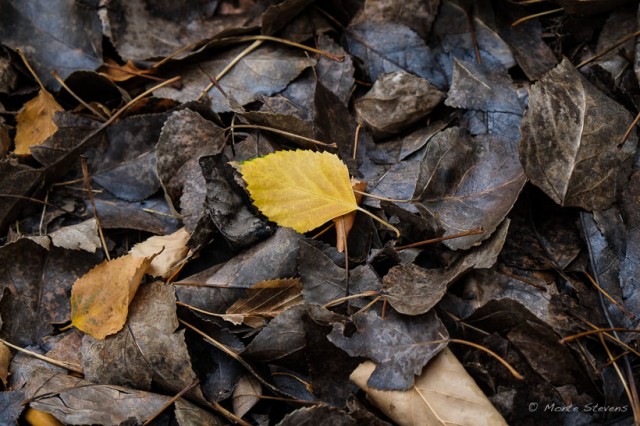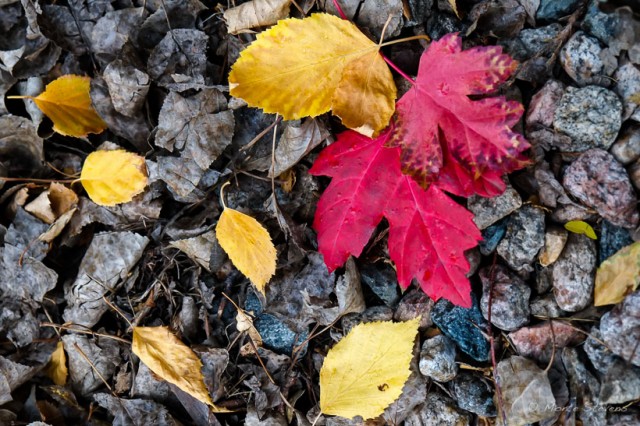“There is something incredibly nostalgic and significant about the annual cascade of autumn leaves.” – Joe L. Wheeler
Each fall I watch the leaves change colors and fall from the trees. A gust of wind blows and leaves are separated from the branches. It’s beautiful to observe. Yet, these leaves fall onto sidewalks, pavement or rock beds. We rake them into piles and bag them, preventing them from living their full life cycle of decomposition, a vital part of nature.
The much needed decay of fallen leaves make what is called “humus,” and this humus is a very important thing to have in the soil. As the fallen leaves decay, valuable mineral salts are carried into the surface soil by the rains and left just where they will be wanted by growing things the following year. The acids produced by the decay of the leaves also help to perform one of the miracles of nature — the changing of rocks and trees and squirrels and wood flowers and fresh milk. These acids of decay dissolve rock; and rock, as you no doubt know, is the original substance out of which soil is made. So the trees, from year to year, are constantly “converting a liability into an asset,” as a business man would say. The stones of the field, which are only a nuisance to the farmer in their raw state, are of great benefit to him when their hidden riches are unlocked — when, by the wonderful alchemy of Nature, they are converted into soil; for the rocks contain sulphur, phosphorus, potash soda, iron, silica — it’s the silica that helps put a good backbone into the wheat blades and the corn — and these things are converted into wood and fruit and nuts and vegetables. And, think about those starving earthworms who need decaying leaves for their survival.
Here’s an interesting fact that I know will make your day: They are finding the dead leaves on the forest floor near Chernobyl, along with the dead pine trees in the infamous Red Forest, don’t seem to be decaying — even a couple decades after the incident. Very interesting.


6 Comments
Earl
As life would have it, our neighbors lawn service was blowing leaves into piles to be carried away at 7:30am this morning…what an annoying sound those leaf blowers are.
I’ve been enjoying the autumn leaves on the forest floor during my walks for a couple of weeks now…they are lovely, as are your photos.
I’m not surprised about the lack of decay near Chernobyl…I imagine most of the bacteria and micro-organisms have be destroyed or altered by the long term radiation.
Have a great day, Monte!
Monte Stevens
The article was interesting to read on Chernobyl and yes it is caused by the radiation affect on the bacteria and micro-organisms. The article said the increase in non decaying leaves was 40% higher, that’s a lot. I consider myself an observer of nature and not a studying scientist so I may not notice such things unless it was 40%.
And that incessant noise from lawnmowers, weed hackers and blowers are constant in this area. This past summer one of those big mowers slid down the grassy edge and into the pond. After I knew the rider was okay, I smiled!
Steve Skinner
It’s good to know that the beautiful fall colors continue to serve long after hitting the ground.
Monte Stevens
Well, said, Steve. And, you guys get such a rich variety of colors in your area. The hardwood colors we see are all trees planted within the city. Our nature areas do not have the maples and walnuts but cottonwoods, birch, oak and conifers.
Tom Dills
When I was a kid I helped with yard work for my grandparents. Rather than bag leaves, we would rake them into piles on a tarp and drag them to the garden, where they would eventually be buried under the snow and decompose over the winter. And in the spring I would till them into the soil for that year’s crop. There were some mighty tasty vegetables out of that garden, and more than a few memories.
Monte Stevens
That’s the way it should be. I am working on a book about myself to pass on to my kids and grandchildren. I’m using as a guide a book given to me by my oldest daughter called My Fathers Legacy. One questions it asked was about the home(s) I was raised in. One home of my youth had an old cellar. I called and talked to dad about it. He told me they would go into the winter with as many as 400 quarts of vegetables, fruits, jams, 100 pound bag of potatoes and carrots in wooded sand box. Most of it from the trees and garden they had. My grandchildren probably have no concept of what work that entailed.